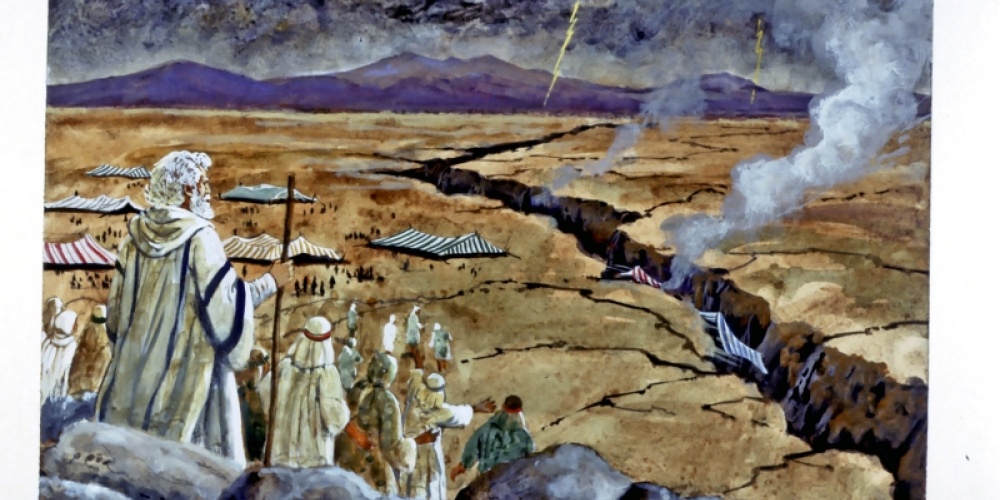Bonjour / Hello [nickname_else_first_name],
Table of contents
1) Perashat Hashavoua - Rabbi Eli Mansour
2) Halakhat Hashavoua (Halakhot related to day to day life) - Hazzan David Azerad
- Kiddush Customs and Covering the Challah
3) Holy Jokes!
4) FOR KIDS!

1)PERASHAT HASHAVOUA
This Week's Parasha Insight with Rabbi Eli Mansour
Parashat Korah: Aharon’s Respect for His Fellow Jews
The Torah in Parashat Korah delineates the twenty-four "Matenot Kehuna" – gifts which the Kohanim are to receive from the rest of the nation. After listing all the various gifts, G-d commands Moshe to tell Aharon that these gifts are a "Berit Melah Olam" – literally, "an eternal covenant of salt" (18:19).
Different approaches have been taken to explain the meaning of this difficult phrase. Rashi writes that just as G-d made a "covenant," so-to-speak, with salt, creating it such that it never spoils, similarly, He promised Aharon that his status of Kehuna will endure forever, eternally.
But there is also a deeper explanation.
The Gemara in Masechet Berachot (34a) teaches that when somebody is asked to lead the prayer service as the Hazzan, he should initially refuse. After he has been asked several times, however, he should not hesitate any longer, and should go lead the service. The Gemara comments that if a person rushes right away to serve as Hazzan without any hesitation, then he is comparable to food without salt. And if he refuses excessively, then he is comparable to food with too much salt. Just as food requires just the right amount of seasoning, as food with insufficient seasoning is bland, and food with excessive seasoning is too strong, similarly, religious life requires a perfect balance between humility and confidence. We must avoid both excessive arrogance and excessive humility. Thus, when we are invited to assume a public role, such as to lead the service in the synagogue, we must be both reluctant and willing, like a dish with the perfect amount of salt.
On the basis of this Halacha, the Sefat Emet (Rav Yehuda Aryeh Leib Alter of Ger, 1847-1905) suggests an explanation for G-d’s statement to Aharon that his status as Kohen is a "Berit Melah Olam." G-d was pronouncing that Aharon struck the perfect balance represented by salt. When the time came for him to serve as Kohen Gadol for the first time, he hesitated, until Moshe urged him to proceed to the altar and perform the service, at which he point he went ahead and performed his duties. This is in contrast to Moshe himself, who, when G-d appeared to him for the first time, at the burning bush, and commanded him to return to Egypt and lead the nation, repeatedly refused. The Rabbis teach that Moshe was to have become the nation’s Kohen Gadol, but because he persistently refused the mantle of leadership, this privilege was taken away from him. Aharon, on the other hand, maintained this delicate balance, as he initially refused but then stepped forward to accept the role assigned to him. And so he was told that his status as Kohen is a "Berit Melah Olam" – an enduring covenant, because he exhibited the quality of "salt," perfectly balancing humility and confidence.
Developing this point one step further, we might ask, why should a person initially refuse but then accept an invitation to serve as Hazzan? What mindset should lead one to at first refuse and then proceed to fill this role?
The answer is that one should initially refuse out of humility, recognizing his unworthiness for such a lofty role, but once he is assured that the Sibur (congregation) wants and needs him to assume this role, he should proceed with confidence, knowing that he brings with him the merit of the Sibur. This is the balance that we need to maintain. We must be humble and aware of our shortcomings, but we must have enough respect for our fellow Jews to firmly believe that with their merit, we are able to stand before G-d in prayer. Aharon was known for his deep love and respect for all his fellow Jews, regardless of their background. Pirkeh Abot famously describes Aharon as "a lover a peace, a pursuer of peace, a lover of people…" He loved and respected all people, and so he was worthy of the Kehuna, a role he assumed with the confidence he gained from his high esteem for the Sibur whom he was serving.
The Rama (Rav Moshe Isserles, Cracow, 1530-1572), in his glosses to the Shulhan Aruch (Orah Haim 167:5), brings from earlier sources that it is proper to have salt on the table when reciting the Beracha over bread. Just as salt must be added to all the sacrifices, the Rama writes, salt should be placed on the table, which resembles the altar in the Bet Ha’mikdash. The Rama adds that placing salt on the table "protects from calamity." The commentators to the Shulhan Aruch explain that this remark is based on a passage in the Midrash stating that when people are sitting at the table waiting for everyone to wash their hands for the bread, the Satan prosecutes against them. We protect ourselves from the Satan’s efforts by having salt on the table.
In light of what we have seen, we can understand the meaning of this custom. Salt represents respect and esteem for all our fellow Jews. When people sit around the table waiting for each other, they are likely to entertain thoughts of hostility and resentment toward one another, thereby empowering the Satan to prosecute against us. We avoid this through "salt" – by maintaining our affection and respect for all our fellow Jews, no matter who they are, following the inspiring example set for us by Aharon Ha’kohen.

2) HALAKHAT HASHAVOUA
Halakhot selected and translated by Hazzan David Azerad
Kiddush Customs and Covering the Challah
from Peninei Halacha
There is a widespread custom to stand during the Friday night kiddush because it attests to the creation of the world, and witnesses must stand when giving testimony. The Arizal, basing himself on mystical considerations, also recommends standing; this is the custom of Sephardim and Ashkenazic Ĥasidim (SA 271:10; Kaf Ha-ĥayim 62). However, most Ashkenazi Jews sit during kiddush since it is supposed to be recited where one will be eating (see section 10 below), and meals are eaten sitting down. Additionally, sitting down together makes the audience and the person making kiddush into a clearly-defined group. There are some Ashkenazim who try to get the best of both worlds by standing during the recitation of Va-yek hulu and sitting down for the rest of kiddush .
All agree that it is preferable to sit for kiddush during the day, and this is the common practice. Nevertheless, some are accustomed to standing, and this is not prohibited.
Even though a woman may make kiddush like a man, it is customary for the man to make kiddush for his family. When multiple families are eating together it is preferable that one person make kiddush for everyone, based on the principle that “In a multitude of people, the King is glorified” .
It is customary to cover the challah during kiddush. Since bread is considered the more important food, normally if we have both wine and bread in front of us and we plan to eat from both, we recite the berakha on the bread first. But when making kiddush, the berakha on the wine must be made first. In order to avoid giving “incorrect” precedence to the wine, we cover the challah. Similarly, if there are mezonot (grain-based foods over which the berakha of Mezonot is recited), they should be covered during kiddush, as mezonot also normally takes precedence over wine. When one is organizing a kiddush for the congregation after services, anyone intending to drink from the kiddush wine must cover any pastries in front of him. One who does not intend to drink from the wine after kiddush need not do so . Based on this explanation, it is not necessary to have the challah on the table when one is making kiddush. If they are on the table, however, they must be covered.
Others provide an additional reason for covering the challah. The two Shabbat challahs allude to the manna that fell during desert times. The manna was covered above and below by layers of dew. To parallel this, the challah is placed above the tablecloth and covered. Accordingly, some people are careful to put the covered challah on the table before kiddush, as a reminder of the manna. Some leave the challah covered until after the recitation of “ha-motzi.” Some even cover the challah at seudah shlisheet for this reason .
Bevirkat Shabbat Shalom Umevorach
David Azerad
3) HOLY JoKeS!!
Selection of funny snippets, loosely related to this weeks parashah or current events, to brighten your day


Click on the image to open the youtube video













